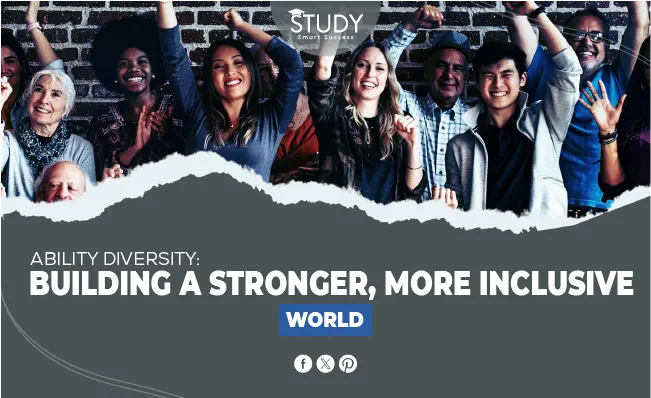Introduction
Brief Explanation of What Ability Diversity Entails
Ability diversity refers to the wide range of skills and disabilities that people have. It includes differences in how people think, feel, and move and how they connect with the world.
Importance of Recognizing and Celebrating Diverse Abilities
Social inclusion and equality require recognizing and honoring varied strengths. Acknowledging and valuing varied abilities and opinions can build a more inclusive and supportive atmosphere. It fosters invention, creativity, and empathy, strengthening the community.
Understanding Ability Diversity
Definition of Ability Diversity and its Significance
Ability variety is the excellent range of abilities and disabilities people have. Physical, cognitive, sensory, and neurological variances show each person’s unique skills. Recognizing ability variety fosters inclusivity, equality, and respect for all.
Different Types of Abilities and Disabilities
- Physical Disabilities: Some of these conditions make it hard to move, such as paralysis, joint differences, or long-term pain.
- Cognitive Disabilities: Learning, remembering, and handling problems are all affected by conditions like dyslexia, autism, or intellectual disabilities.
- Sensory Disabilities: People with vision or hearing impairments need accommodations for efficient communication and information access.
- Neurological Disabilities: Epilepsy, ADHD, and Tourette syndrome influence brain and nervous system function, behavior, and movement.
Common Misconceptions and Stereotypes Surrounding Ability Diversity
- Assumption of Dependency: People with disabilities are often thought to be dependent and unable to make essential contributions to society.
- Homogeneity: It is common for people to think that all people with the same handicap have the same problems or skills.
- Pity or Inspiration: Some see disabled people with pity or respect, ignoring their abilities.
- Inferiority: Disabled people may be stereotyped as lesser or less capable, perpetuating prejudice and exclusion.
Understanding and fighting these false beliefs is essential to making society more accepting and respectful of people with different abilities.
The Benefits of Embracing Ability Diversity
Enhanced Innovation and Problem-Solving
Adopting Diversity in the workplace encourages new ideas by bringing together people with different points of view and ways of handling problems. People with various skills often develop new ideas and ways to solve challenging problems, sparking imagination and pushing the limits.
Increased Creativity and Perspectives
People with different skills bring many other ideas and experiences, making conversations more exciting and creative. People with different cognitive styles and ways of handling information can bring new ideas and ways of doing things to the table, leading to more creative and innovative results.
Building an Attitude of Understanding and Empathy
Recognizing and praising the different kinds of skills people have helps team members understand and empathize with each other. By identifying and meeting the needs and experiences of people with different backgrounds, businesses make it possible for everyone to feel appreciated and respected, which leads to better relationships and teamwork.
Improving Organizational Performance and Productivity
Research shows that ability variety improves organizational performance and production. By exploiting team members’ skills and offering required accommodations, firms can maximize worker efficiency and performance. Creating an inclusive workplace where all employees feel valued and encouraged can raise morale and reduce attrition, improving organizational performance.
Overcoming Challenges in Embracing Ability Diversity
Addressing Accessibility Issues in the Workplace and Society
Accessibility in business and society is a significant barrier to integrating ability diversity. This includes wheelchair ramps, accessible facilities, and disability-friendly websites and technologies. Businesses and communities can welcome people of all abilities by identifying and removing accessibility barriers.
Tackling Unconscious Biases and Discrimination
Unconscious biases and discrimination might hamper ability diversity. Organizations must recognize these biases and take steps to mitigate them. Diversity and inclusion training, open discourse about unconscious prejudices, and fair and equal workplace regulations may be needed.
Providing Necessary Accommodations and Support
Another issue is providing different learners with the accommodations and assistance they require. It may include assistive technology, flexible work arrangements, and hiring and workplace modifications. Companies may foster an inclusive culture where everyone thrives by proactively identifying and meeting the needs of diverse employees.
Conclusion
In conclusion, having a range of abilities is essential for making society more open, fair, and respectful. By recognizing and celebrating the unique skills and points of view of people with different abilities, we can make the world a more accepting and helpful place for everyone.
Let us imagine a world where various abilities are valued, and people are judged by their talents and contributions, not their limitations. By spreading knowledge, acceptance, and inclusion, we can enable everyone to attain their most significant potential, regardless of ability. Let’s work toward a future where diversity is celebrated, and everyone is accepted and loved.
Additional Resources
Links to further reading materials, organizations, and support networks
- The American Association of People with Disabilities (AAPD)
- Disability Rights Education & Defense Fund (DREDF)
- National Organization on Disability (NOD)
- World Institute on Disability (WID)
Books:
- “The Disability Rights Movement” by Doris Zames Fleischer and Frieda Zames,
- “No Pity: People with Disabilities Forging a New Civil Rights Movement” by Joseph P. Shapiro,
- “Being Heumann: An Unrepentant Memoir of a Disability Rights Activist” by Judith Heumann.
Suggestions for ways to get involved in Promoting Ability Diversity
- Volunteer with organizations that support individuals with disabilities, such as local disability advocacy groups, community centers, or schools.
- Advocate for accessibility and inclusivity in your workplace, school, or community by raising awareness about accommodating diverse abilities.
- To learn more and connect with like-minded individuals, attend events, workshops, and conferences focused on disability rights and inclusion.
- Support businesses and organizations prioritizing inclusivity and accessibility by purchasing products or services and spreading the word.
- Educate yourself and others about disability rights and issues by reading books, watching documentaries, and engaging in discussions with people with diverse abilities.
Being involved in these events is a great way to support people of different abilities and make society more fair and open to everyone.


